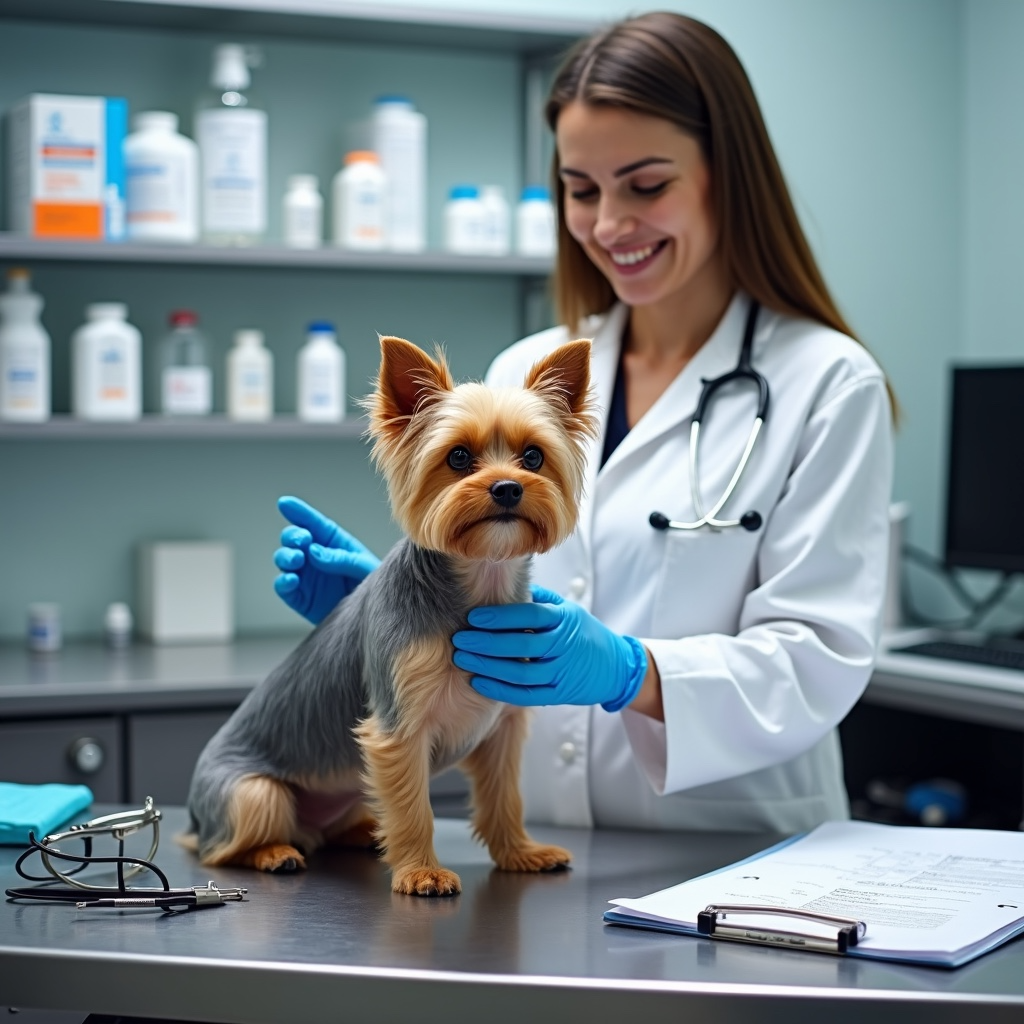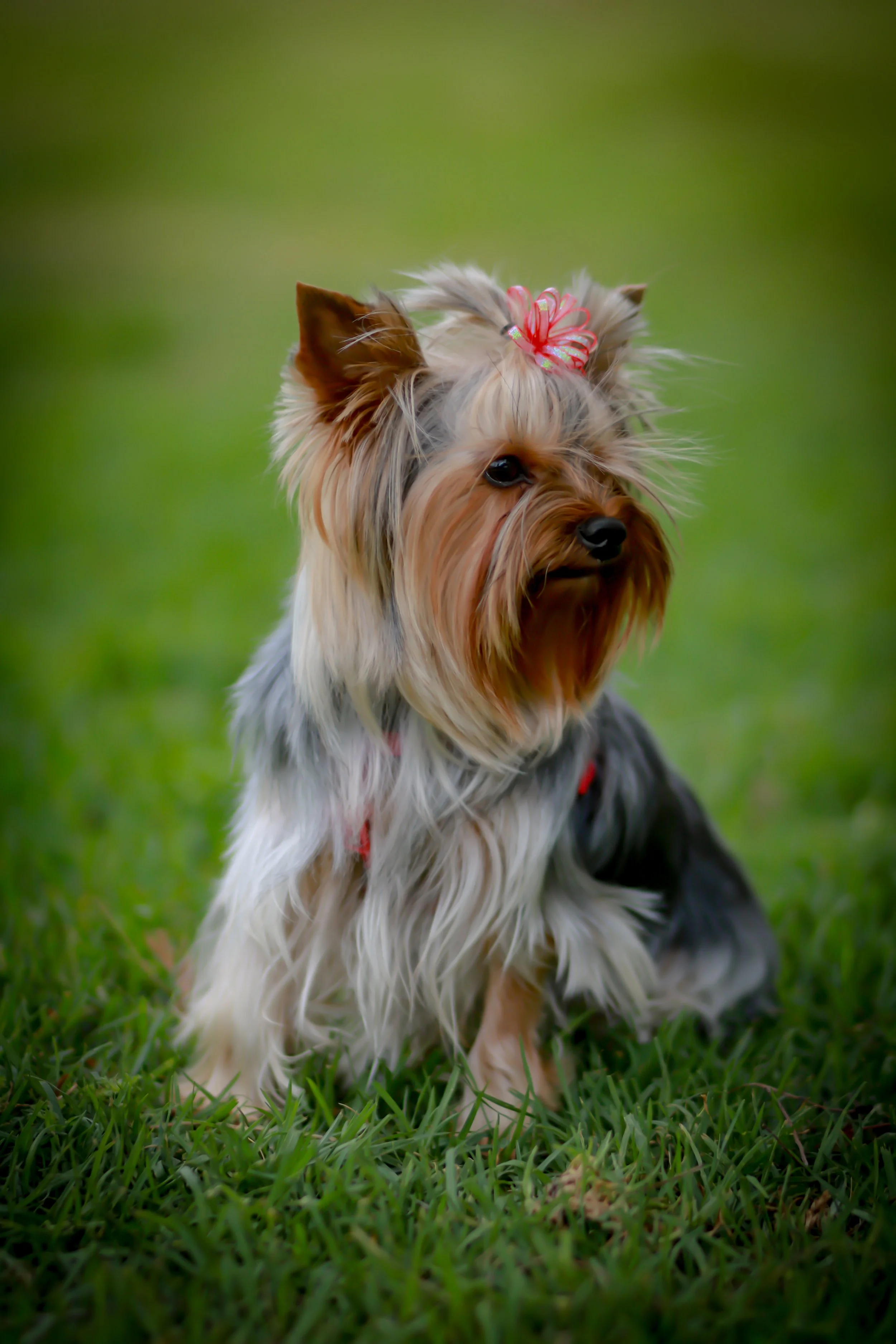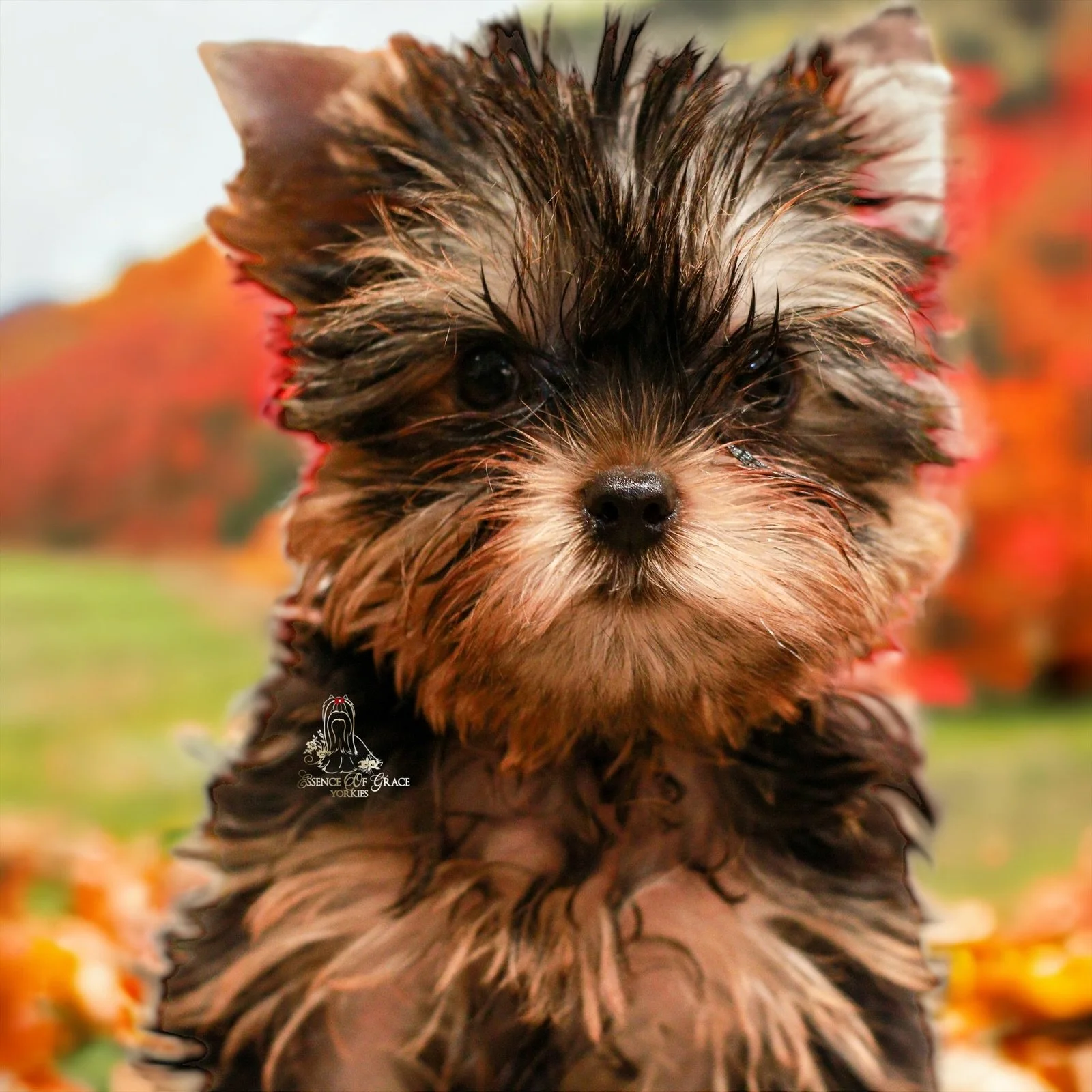Common Health Issues in Female Yorkies and How to Prevent Them
Learn about common health concerns in female Yorkies and how to prevent them. From dental care to reproductive health, this guide offers essential tips to keep your female Yorkshire Terrier happy and healthy.
Female Yorkies are adored for their beauty, intelligence, and affectionate nature. However, as with all breeds, they are susceptible to certain health issues that owners should be aware of, particularly those that affect female Yorkie puppies and adult females. By understanding common health challenges in female Yorkshire Terriers, owners can take proactive steps to keep their pets healthy and happy.
1. Reproductive Health Concerns
Female Yorkies face specific reproductive health risks, such as pyometra (uterine infection) and mammary tumors. Pyometra is a severe infection that occurs in unspayed females, often requiring emergency surgery.
Prevention Tips:
Spaying: Consider spaying your female Yorkie if you’re not planning to breed her. Spaying reduces the risk of reproductive cancers and eliminates the chance of pyometra.
Regular Vet Check-ups: Routine vet visits allow early detection of any abnormalities in your Yorkie’s reproductive organs.
Understanding these reproductive risks and taking preventive measures will help ensure your female Yorkie’s long-term health.
2. Dental Issues in Female Yorkies
Dental issues are common in female Yorkie puppies and adult Yorkies due to their small mouths, which can lead to overcrowded teeth. Plaque buildup, gum disease, and tooth decay are frequent issues that can result in discomfort, bad breath, and more severe health concerns.
Prevention Tips:
Daily Brushing: Regular brushing with dog-safe toothpaste can help maintain dental health in your female Yorkie.
Dental Treats and Chews: Dental chews can reduce plaque and tartar buildup, helping keep her teeth clean between brushings.
Routine Dental Cleanings: Annual cleanings performed by a veterinarian are essential, especially as your female Yorkshire Terrier ages.
A proactive approach to dental care not only keeps her teeth and gums healthy but also contributes to her overall well-being.
3. Joint and Bone Health
Yorkies, including female Yorkies, are prone to joint and bone issues such as patellar luxation (dislocation of the kneecap) and Legg-Calvé-Perthes disease, which affects the hip joint. These conditions can cause discomfort and impact mobility.
Prevention Tips:
Weight Management: Keeping your female Yorkie puppy at a healthy weight reduces strain on her joints.
Joint Supplements: Speak to your vet about introducing joint supplements, especially as she grows older.
Exercise: Regular, moderate exercise strengthens muscles, supporting her joints and overall structure.
With attentive care, you can reduce the risk of joint issues in your female Yorkie and help her maintain an active lifestyle.
4. Hypoglycemia in Female Yorkie Puppies
Hypoglycemia (low blood sugar) is particularly common in small dog breeds, especially female Yorkie puppies. Symptoms can include weakness, confusion, and even seizures if left untreated.
Prevention Tips:
Frequent Feeding: Young Yorkies may need small, frequent meals to stabilize their blood sugar levels.
High-Quality Diet: Ensure your female Yorkie puppy has a balanced diet rich in protein and nutrients.
Regular Monitoring: Be observant of any unusual signs, particularly lethargy, which could indicate low blood sugar.
Ensuring your Yorkie’s nutritional needs are met is key to preventing hypoglycemia, which can be life-threatening if not addressed promptly.
5. Eye Problems in Female Yorkshire Terriers
Eye problems, such as dry eye, cataracts, and progressive retinal atrophy (PRA), are often seen in Yorkies as they age. Proper eye care can help minimize the risk of serious issues that can affect your female Yorkshire Terrier’s vision and comfort.
Prevention Tips:
Eye Wipes: Clean her eyes gently with vet-approved eye wipes to prevent irritation.
Regular Eye Exams: Annual vet check-ups that include eye exams can catch early signs of eye diseases.
Protective Measures: Avoid exposing her to irritants, such as dust or wind, that could cause dryness or irritation.
Early detection and routine eye care will help maintain your female Yorkie’s vision and comfort.
Final Thoughts on Preventing Health Issues in Female Yorkies
Being proactive about your female Yorkie’s health can prevent many common issues and extend her quality of life. From dental care to weight management, taking small daily steps can make a big difference. Understanding the unique health challenges that can affect female Yorkie puppies and adult female Yorkshire Terriers enables you to give her the best care possible, ensuring she stays happy and healthy by your side.
If you have any concerns about your female Yorkie’s health, consult with a veterinarian to discuss preventative care options tailored to her specific needs.
4o
Essential Guide to Tail Docking and Dewclaw Removal in Yorkshire Terriers: What You Need to Know
Discover the essentials of tail docking and dewclaw removal for Yorkshire Terriers in our comprehensive guide. Learn why these procedures are performed, what to expect during the process, and the ethical considerations involved. Whether you're a current Yorkie owner or considering bringing one into your home, understanding these traditional practices is crucial for ensuring your puppy’s health and well-being. Explore the reasons behind tail docking and dewclaw removal, and get expert advice on caring for your Yorkie's unique grooming needs.
Essential Guide to Tail Docking and Dewclaw Removal in Yorkshire Terriers: What You Need to Know
When it comes to the care and preparation of Yorkshire Terriers, tail docking and dewclaw removal are two important procedures that often come up. These practices have been part of traditional Yorkshire Terrier grooming and health care, but they are sometimes misunderstood. This guide will walk you through everything you need to know about tail docking and dewclaw removal, ensuring you make informed decisions for your beloved Yorkie.
What is Tail Docking?
Tail docking is the surgical removal of a portion of a puppy's tail. This procedure is typically performed within the first few days of life. Historically, tail docking was done to prevent injury to working dogs, but in modern times, it is often done for breed standards and aesthetic reasons. For Yorkshire Terriers, tail docking helps maintain the breed’s traditional appearance, characterized by a compact, well-proportioned tail.
Why is Tail Docking Done?
Breed Standards: Many dog breeds, including Yorkshire Terriers, have specific breed standards that include tail docking. The appearance of the docked tail is seen as part of the breed's traditional look.
Health Considerations: In the past, tail docking was believed to prevent injuries in working dogs. However, for Yorkshire Terriers, this is less of a concern as they are primarily companion animals.
What is Dewclaw Removal?
Dewclaw removal is the surgical removal of the small, extra claws located on the inside of a dog’s front legs. For some dogs, dewclaws can also be present on the hind legs. Dewclaw removal is usually performed at the same time as tail docking, often within the first few days of life.
Why is Dewclaw Removal Done?
Prevent Injury: Dewclaws can sometimes become snagged or injured, particularly in active dogs. Removing them can help prevent potential injuries.
Breed Standards: Similar to tail docking, dewclaw removal can be part of maintaining the breed's traditional appearance and conforming to specific breed standards.
The Procedure: What to Expect
Tail docking and dewclaw removal are typically performed by a veterinarian. The procedures are generally quick and are done under anesthesia to ensure the puppy's comfort. Post-procedure care involves monitoring the puppies to ensure they heal properly.
Timing: These procedures are usually done when the puppies are between 3 and 5 days old, as they are less likely to experience significant pain and recover quickly.
Aftercare: Puppies will need to be monitored for any signs of infection or complications. The vet will provide instructions for care and what to look out for during the healing process.
Controversy and Considerations
It’s important to note that tail docking and dewclaw removal are subject to ethical debates and varying regulations. In some countries and states, these procedures are restricted or banned unless performed for medical reasons. It's crucial to understand and comply with local laws and regulations regarding these practices.
Conclusion
Tail docking and dewclaw removal are traditional procedures that have been part of the care and grooming of Yorkshire Terriers. Understanding the reasons behind these practices, the procedures themselves, and the ethical considerations can help you make informed decisions about your Yorkie’s care. Always consult with a qualified veterinarian to discuss the best options for your puppy and ensure their health and well-being.
For more information on Yorkshire Terrier care, breeding, and show standards, visit Essence of Grace Yorkies.
Yorkie Puppy Care
Caring for Your New Yorkie Puppy: Essential Tips for a Happy, Healthy Start
Bringing home a new Yorkshire Terrier puppy is an exciting experience! At Essence of Grace Yorkies, we understand that Yorkie puppy care is crucial for ensuring a smooth transition and a happy, healthy life. Our comprehensive guide covers everything you need to know about caring for your new Yorkie, from creating a safe space to feeding, grooming, and socializing.
Creating a Safe Space for Your Yorkie Puppy: Provide a cozy, secure area with soft bedding and toys to help your Yorkie adjust to their new home.
Feeding Your Yorkie Puppy: Opt for high-quality, nutritious puppy food tailored for toy breeds, and feed smaller meals throughout the day to meet their high energy needs.
Potty Training Your Yorkie: Establish a consistent routine and reward positive behavior to effectively potty train your Yorkie.
Grooming Your Yorkie Puppy: Regular brushing, bathing, and professional grooming are essential to maintain your Yorkie's beautiful coat.
Vaccinations and Vet Visits: Ensure your Yorkie receives regular vet checkups and stays up to date on vaccinations to monitor their health.
Socializing and Training Your Yorkie Puppy: Introduce your puppy to various environments, people, and pets, and start basic obedience training with positive reinforcement.
By following these tips, you’ll give your Yorkshire Terrier puppy the best start in life. For more information or to find your perfect Yorkie, contact Essence of Grace Yorkies. Our puppies are raised with care, health-tested, and ready to become cherished members of your family.
Caring for Your New Yorkie Puppy: Essential Tips for a Happy, Healthy Start
Bringing home a new Yorkshire Terrier puppy is an exciting experience! These tiny, affectionate dogs make wonderful companions, but they require special care to ensure they grow into happy, healthy adults. At Essence of Grace Yorkies, we prioritize setting our puppies up for success in their new homes. In this guide, we’ll cover essential tips for caring for your new Yorkie puppy, from feeding and grooming to training and socialization.
Creating a Safe Space for Your Yorkie Puppy
Your new Yorkie puppy will need a cozy, safe area to call their own. Whether it’s a crate or a small puppy-proofed room, provide soft bedding and a few toys to keep them entertained. A confined space helps your Yorkie feel secure and eases their transition into a new environment.
Feeding Your Yorkie Puppy a Nutritious Diet
Yorkshire Terriers have small stomachs but high energy needs. Be sure to feed your Yorkie a high-quality puppy food that meets the specific needs of toy breeds. We recommend feeding smaller meals throughout the day to help maintain their energy levels and prevent hypoglycemia, a condition Yorkies can be prone to.
Potty Training Your Yorkie
Potty training a Yorkie requires patience and consistency. Start by establishing a routine and taking your puppy outside to the same spot regularly. Reward your puppy with praise or treats when they go potty outside to reinforce positive behavior. Remember, accidents will happen, so be prepared to stay calm and consistent throughout the process.
Grooming Your Yorkie Puppy
Yorkshire Terriers are known for their beautiful, silky coats, but regular grooming is essential to keep it looking its best. Start brushing your puppy’s coat daily to prevent tangles and mats. Introduce your Yorkie to baths, nail trimming, and ear cleaning at an early age so they become comfortable with the process. Professional grooming will also be necessary to keep their coat in top condition.
Vaccinations and Vet Visits
Your Yorkie puppy will need to visit the vet regularly for vaccinations and health checkups. At Essence of Grace Yorkies, our puppies are up to date on vaccinations before going to their new homes, but it’s important to continue with the recommended vaccination schedule. Regular checkups will also ensure your puppy stays healthy and catches any potential issues early.
Socializing Your Yorkie Puppy
Socialization is key to raising a well-adjusted Yorkshire Terrier. Expose your Yorkie puppy to different people, environments, and other pets to help them develop confidence and good behavior. Keep experiences positive and start slowly, especially when introducing your puppy to new places and people.
Training Your Yorkie Puppy
Yorkies are smart and eager to learn, but they can also be a bit stubborn. Begin basic obedience training early, focusing on commands like sit, stay, and come. Positive reinforcement methods work best with this breed. With consistency and patience, your Yorkie will quickly learn what’s expected of them.
Ensuring a Smooth Transition
Moving to a new home can be overwhelming for your Yorkie puppy. Help them adjust by sticking to a routine and providing lots of love and attention. At Essence of Grace Yorkies, we socialize our puppies to ensure they’re well-prepared for their new families. If you ever have questions or need advice, we’re always here to support you as you raise your new furry family member.
Conclusion
Caring for a new Yorkie puppy requires time, patience, and love, but the rewards are well worth it! By following these tips, you’ll be giving your Yorkshire Terrier the best start in life. If you’re looking to add a Yorkie puppy to your family or need further guidance, Essence of Grace Yorkies is here to help. Our puppies are raised with care, health-tested, and ready to bring joy into your home.


